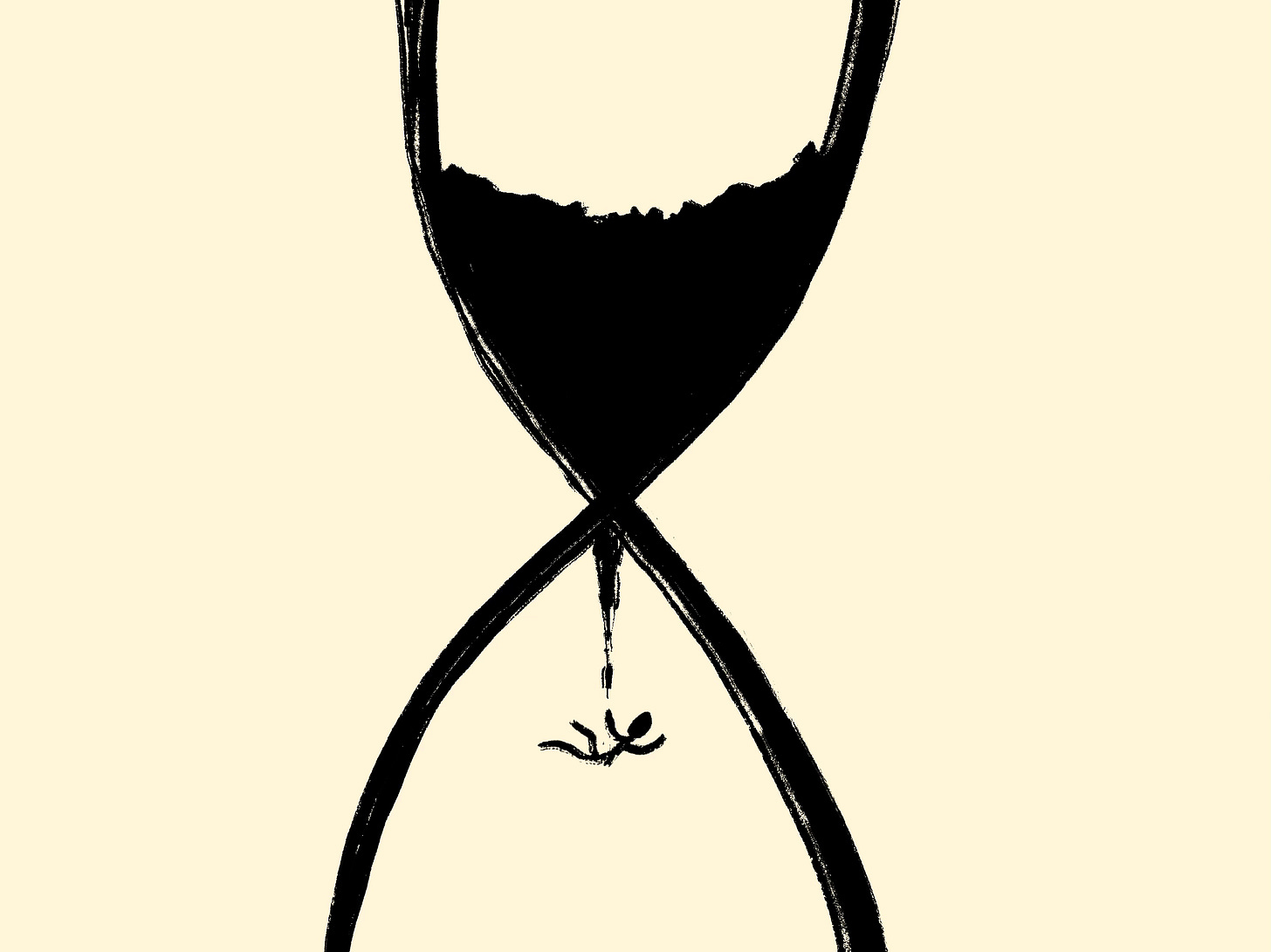Better than Efficiency (Efficiency Pt. 2)
A meditation on the alternative to being ruled by Efficiency- understanding our humanity.
A number of years ago now, my mum decided that we were not going to have a microwave anymore. There were a number of reasons (some aesthetic, some ideological), and so when we finished re-doing our kitchen, no place was set aside for the microwave, and the one we had disappeared into the garage, never to be seen again. 'What do you mean you don't have a microwave?' people would ask incredulously, 'how do you heat up food!?' (Please enjoy the iconic Nigella talking about her microwave)
The other day as I was slowly heating my lunch up on the stove (that's how, if you were wondering) I was mulling through my blog on efficiency and a thought struck me (This is a good moment to go read part one if you haven’t). It transformed my initial frustration at how slow and inefficient this process was into the rebellious thrill of doing something utterly counter-cultural. My slow lunch reheating was a transgressive act. I chose instead to revel in this inefficient process. A tiny, hidden moment of sticking it to the efficiency mindset. You should try it some time! I've felt the same on my commute to church, a time when I cannot be any more productive than getting myself to my destination. Traffic? That's ok because I am embracing inefficiency! I'll just pop on another album, and enjoy this time I have to do nothing. There is a great sense of freedom in those moments of embracing taking it slow.
But as I reflected further, I began to wonder. Is a simple embrace of inefficiency the answer to the woes of being ruled by the efficiency that I outlined in part one? I think it could partially help. But I do think if that is as far as we go, then in the end we're just replacing one problem with another. If we embraced inefficiency with the same fever, then we would be wasting time rather than squeezing it for all its worth. What truly underlies the obsession is this: Our culture is deeply confused as to what it means to be human. And because of this, we have no clue about what is actually good for us. So I have realised that in dealing with the problems of efficiency, we must instead turn to a theological anthropology to help us better understand who we are, and then what is good for us.
The Heart of Wisdom
A verse has just kept floating to the front of my mind as I have been thinking about this:
“Teach us to number our days, that we may gain a heart of wisdom.”
Psalms 90:12 NIV
On first glance, this might feel like a reason to be more efficient - we have limited time! Pack more in! That does often seem to be the attitude of the world around us, but I think this verse implies the opposite. It's a reminder of our limits, and it makes us humble. The heart of wisdom is knowing that we are limited creatures with limited time. A definitive end. Psalm 90 meditates on the supremacy of God, "from everlasting to everlasting you are God" (v2). He is timeless, limitless, and his wrath is terrible. And so the heart of wisdom is knowing what our limits are before our limitless God. And accepting it. Reflecting on our limited human nature and our limitless God is the greatest cure I can think of for being captured by efficiency.
There is great freedom in remembering we are not God, nor should we ever try to be.
God has given us the limits of the time we have in our bodies on this side of the new creation. Living wisely is living recognising these limits.
As we live in this messy middle, we need someone to show us the way.
Looking at Jesus is instructive for many things, but I have become more and more convinced that Jesus should be at the core of our anthropology. He shows us what a sinless human living in a sinful world looks like. Looking at him helps us to sift out what is sinful in our nature and what is a good. So lets linger a moment on this point.
God didn't just plonk a fully grown adult Jesus on earth. No, again he took his time and respected his own good design for creation.
Jesus began life as an embryo in his mother's womb.
He spent nine months growing there before being born.
He went through childhood.
He was a teenager.
He grew up.
He went through all the normal human processes. The slow years of growing up.
God could have made Jesus as a fully grown 30 year old, he can do anything.
But instead he lived a fully human life.
He took his time, he embraced the limits of creatureliness. After all, he is the one who made those limits.
He set aside time to pray. He slept. He made time for people. He was unhurried in all he did, trusting God's timing.
If embracing limits and investing in relationships is what Jesus did, then in that we see a picture of humanity as it is meant to be.
Jesus shows us the bounds of our humanity. The edges that we should accept and not try and stretch beyond. And I think two of these bounds are instructive and helpful in letting go of the obsession with efficiency, so we'll spend the rest of the time reflecting on them.
1. Relationships
God has made us for relationships, with him first and foremost, and through him with others. It is inescapable. But human relationships are not efficient. Getting to know and trust people takes time. In our obsession with efficiency, what we sacrifice is a foundational aspect of our humanity. Relationships are an act of creation. Creating a connection where there was none. In forging a new connection with someone, we invest something of ourselves into that relationship. It is a creative struggle to form these connections. What Nick Cave said of creative acts in part one applies to relationships too- The striving, the investment of effort is what makes them wonderful and worthy. And unlike an AI image, there is no hack to make that process more efficient.
Jesus made time for his relationships. For unhurried walks, and slow meals. He knew they were important and so he spent so much of his time with people. But most especially he prioritised time with his father. Time in prayer. Over and over again the gospels record these moments when he withdraws to pray.
I think nowhere is my worship of efficiency painted in such stark colours as in my struggles with prayer. It can so often feel like an inefficient use of my time. With the many things I want to fit in the day glaring down at me, the last thing I want to do is pray. Finding the most efficient path through the day tugging at my mind from the morning. Tugging me away from stopping. From doing nothing else but sitting and talking to God. Prayer is an expression of our relationship with God. Our dependence on him as our loving heavenly father.
In prayer I accept my limits. And rely on the one who is limitless.
In prayer I pour myself into deepening my relationship with God.
I can't make this process more efficient because by doing so I undermine the very things that makes it good.
We are made for relationships, and most especially a relationship with God.
We cannot exist without relationships. And when we are ruled by efficiency, it is relationships that often pay.
2. Limits
I have always been so drawn to the stories about Jesus where he is sleeping, or where he withdraws for a quiet moment, alone or with a trusted few. Reflecting further I think I am drawn to them because it shows Jesus at his most human, and it shows me that it is ok to need those things. To grow tired and need a rest, to want a break, to spend time alone recharging.
These things are good. Jesus, the sinless human did them! So these are not things that should fill us with guilt. They are things that we should embrace gladly, if it is good for the incarnate son, Limitless God become flesh, then is must be good for me, an average, sinful human.
Here, I think considering what a sabbath looks like is helpful. Sabbath is an inbuilt pattern that both reminds us of our limits, and helps us live wisely within them. So much guilt can be piled on this concept, and I think we can be unhelpfully prescriptive about it, forgetting that the sabbath was made for man, not the other way around. But finding time in our week to revel in your limits, and trust our limitless God is good for us. We all have seasons of busyness and varying intensity, but what might it look like to do this in any season? It might not be as long as an entire day doing nothing much (though that is great) but maybe it is a morning where you have a sleep in, and spend unhurried time in the word over a warm beverage. How might you listen to your limited body's rhythms like Jesus did?
This has been a longer, more rambling journey than I ever expected when I decided to write something on efficiency. I haven't even covered half the thoughts I had, and it's already exhaustingly long! We all have times when we have to pack our days as carefully as a moving truck to fit in all we need to. But I hope these reflections have reminded you that there are things more important that efficiency. It's not good for us to live against our nature, and our obsession with efficiency leads us to act in ways that do. It may be a useful tool, but a terrible master. So instead let's learn to embrace the thill of the inefficient but better. To understand our nature, and take pleasure it it. To nurture our relationships, and live wisely within our limits.
Next time you feel that pull to frustration and efficiency, maybe stop and ask yourself- do I need to tie myself up in guilt-inducing knots, or is this a moment I can let go and be free from efficiency’s inhumane rule?





